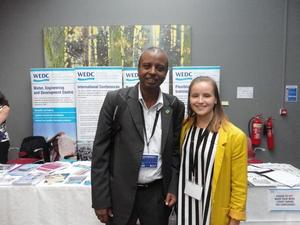CMP draws attention in International WEDC Conference
Water, Engineering and Development Center (WEDC) organized the 38th international conference with a theme ‘water, sanitation and hygiene services beyond 2015’ in Loughborough University in England from 27-31 July 2015. The conference that brought together 350 international WASH practitioners, researchers and donors from 47 countries, gave due emphasis on improving access and sustainability of Water, Sanitation and Hygiene (WASH) services.
Over the course of five days, about 120 different topics, ranging from sanitation in very cold climate to public private partnerships in WASH, were presented. Oona Rautianen, Junior Expert at Community-Led Accelerated (COWASH), a project that supports the implementation of Community Managed Project (CMP) in Ethiopia, presented a case study that focuses on the development, scaling up and achievements of the CMP approach.
It was a session that turned to be among those discussion sessions with maximum audience who inspired lively discussions through their questions, comments and/or suggestions. Their overall understanding of WASH Sector in Ethiopia was also further enhanced following the presentation and discussion on One WASH National Program.
A deliberation that resulted from the presentation of the legalization process of Water, Sanitation and Hygiene Committee (WASHCO) in Southern Nations, Nationalities and Peoples’ (SNNP) national regional state reflected the opportunities and challenges related to the provision of WASH services in Ethiopia- a country with many of its citizens still lack access to safe water and improved sanitation and hygiene facilities.
The emerging topics on this year’s conference were the different ICT solutions in WASH service provision, capital maintenance of WASH schemes and “Payment by results”-model currently implemented by DFID in a 35 million pound program. Out of all the topics sanitation received a greatest number of attention when it came to the number of presentations, sessions and side events. This was welcomed as an important development in the WASH sector which has long been more focused on water supply than on sanitation and hygiene.
The most valuable part of the conference week were the discussions and experience sharing between the participants coming from a numerous different professional backgrounds all sharing a passion to sustainable water and sanitation service provision. As Mr. Silver Mugisha, the Director of National Water Supply Corporation of Uganda summarized in his keynote speech on the opening ceremony: “Our heads are made for thinking, not for carrying water”.


